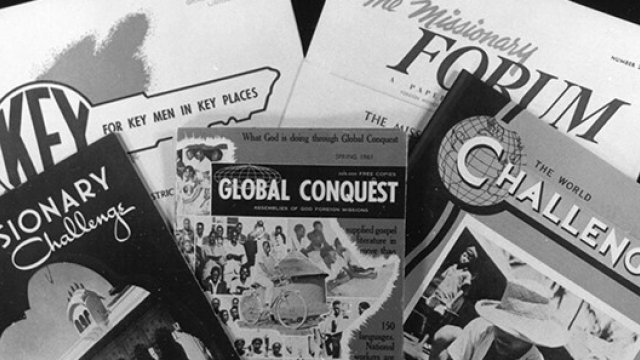Assemblies of God Missions Publications: From Missionary Challenge to Worldview Magazine
This Week in AG History —August 30, 1959 By Ruthie Edgerly ObergOriginally published on AG News, 01 September 2022 The Pentecostal revival that birthed the Assemblies of God in 1914 brought with it a revival of dedication to the mission … Continue reading

Assemblies of God Missions Publications: From Missionary Challenge to Worldview Magazine

This Week in AG History —August 30, 1959
By Ruthie Edgerly Oberg
Originally published on AG News, 01 September 2022
The Pentecostal revival that birthed the Assemblies of God in 1914 brought with it a revival of dedication to the mission that each believer must “go into all the world and preach the gospel.” There was an urgency to take the message to the ends of the earth and, along with that, was born a pressing need to communicate the progress of this effort, along with its needs and concerns.
The first official weekly publication of the Assemblies of God, the Christian Evangel (later renamed the Pentecostal Evangel), began publishing updates and needs from the 32 recognized missionaries approved at the first General Council in April 1914. J. Roswell Flower, the first general secretary and, in 1919, the first missions secretary, also served as the editor of the Evangel and sought to use the publication to bring increased cooperation from the churches in support of the missions effort.
In 1944, under the direction of editor Kenneth Short, a separate quarterly publication devoted exclusively to missions was created. The Missionary Challenge (later changed to World Challenge) carried a format that highlighted a variety of updates from the field, emphasized a field in focus, provided a daily prayer devotional plan, and a prayer list for each missionary’s birthday. It also included a Junior Challenge with a story written specially to communicate to children the need for world missions.
As more departments of the General Council were created, the publication was used to highlight reports and opportunities provided by the Women’s Missionary Council (WMC), Boys’ and Girls’ Missionary Crusade (BGMC), Light for the Lost (LFTL), and Speed the Light (STL).
In March of 1959, World Challenge announced that the missions publication would merge with the denominational weekly, the Pentecostal Evangel, in order to increase the circulation of missionary articles.
However, the Aug. 30, 1959, issue of the Pentecostal Evangel features the relatively new promotions secretary of the Foreign Missions Department, J. Philip Hogan, announcing a new missions publication in an article titled, “Why Another Missionary Magazine?”
The new periodical was called Global Conquest after the new initiative approved by the missions department. Hogan gave three reasons for the decision to return to a separate missions publication: 1) The 1960s promised to be an era of “stepped-up communications” and the voice of missions must assert itself to be heard amongst the competing voices; 2) The commitment of the Assemblies of God was to communicate with each donor what was happening with their investment; and 3) Missions deserved “priority status” so as not to be lost among other reports featured within the larger Evangel publication.
Global Conquest continued as the official missions initiative, along with the free quarterly publication of the same name until 1967, when it was determined that some people incorrectly thought the title implied political ambitions. The name was changed to Good News Crusades, in support of the mass evangelism efforts of city outreaches, also called Good News Crusades, taking place on the field. The publication was changed from quarterly to bi-monthly.
In 1979, missions leaders realized that “crusades” might also carry bad connotations in some parts of the world and Good News Crusades was replaced by a monthly magazine, Mountain Movers. This periodical was sent free of charge to every Assemblies of God missions donor for almost 20 years. Joyce Wells Booze served as its initial editor. Under her leadership, there was a concerted effort to provide short articles written by missionaries on a reading level that would appeal to all ages.
Mountain Movers was merged into the Pentecostal Evangel in 1998, and the first Sunday edition of each monthly Evangel featured solely missions content. This practice continued until the Pentecostal Evangel ceased print publication in 2014.
Without the Pentecostal Evangel, Assemblies of God missions leaders felt it was vital to continue a steady stream of print communication about the needs and concerns of the worldwide evangelistic mission of the church. Worldview magazine was commissioned in 2015 as a monthly periodical to continue to fulfill the imperative of the mission enunciated by Hogan in 1959: to ensure that world evangelism is a priority in the Assemblies of God.
Read the announcement of the publication of Global Conquest on page 7 of the Aug. 30, 1959, issue of the Pentecostal Evangel.
Also featured in this issue:
• “Pentecost in the Philippines,” by Alfred Cawston
• “Miracles in A Missionary’s Life,” by C.M. Ward
• “Reaching the Children for Christ,” by Leonard and Genevieve Olson
And many more!
Click here to read this issue now.
Pentecostal Evangel archived editions courtesy of the Flower Pentecostal Heritage Center.
Do you have Pentecostal historical materials that should be preserved? Please consider depositing these materials at the Flower Pentecostal Heritage Center (FPHC). The FPHC, located in the Assemblies of God national offices, is the largest Pentecostal archive in the world. We would like to preserve and make your treasures accessible to those who write the history books.
Flower Pentecostal Heritage Center
1445 North Boonville Avenue
Springfield, Missouri 65802 USA
Phone: 417.862.1447 ext. 4400
Toll Free: 877.840.5200
Email: archives@ag.org
Website: www.iFPHC.org
